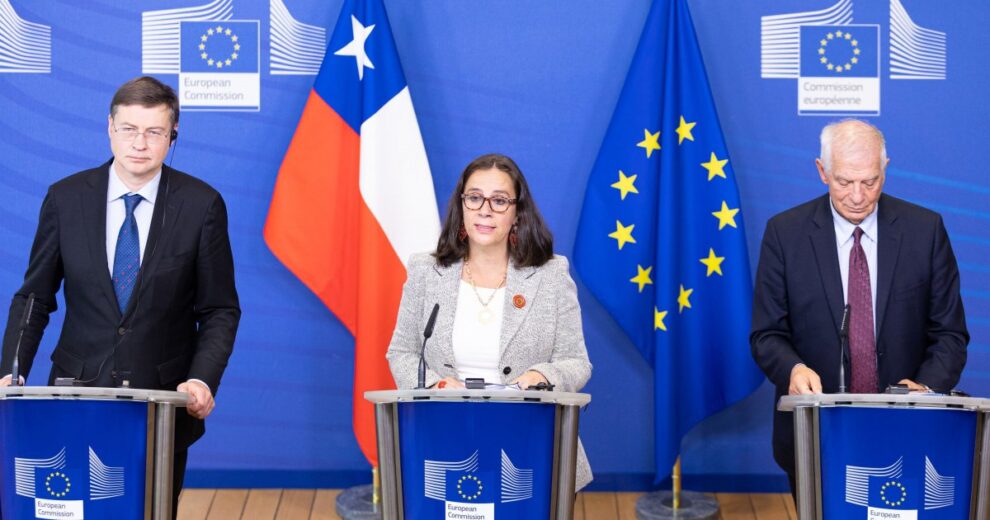The Council today adopted two decisions to sign the Advanced Framework Agreement (AFA) and the interim Trade Agreement (iTA) with Chile, which together constitute an updated version of the EU-Chile Association Agreement currently in place.
The new agreement will strengthen EU-Chile political and economic relations and deepen cooperation and trade. It will help to jointly address new global challenges such as the repercussions of the Russian invasion of Ukraine, including global inflation, supply chain disruptions and the energy crisis.
The EU-Chile Trade Agreement will reinforce the EU’s open strategic autonomy and economic security, strengthening the resilience of supply chains and diversifying imports of key inputs for the green transition as well as export opportunities for European companies.Nadia Calviño, Spanish Minister of Economy, Trade and Enterprise
The updated Association Agreement with Chile is another step forward in the strengthening of relations between the EU and Latin America. It addresses the changes that have occurred since the signing of the current Association Agreement and the emergence of new global challenges. It will intensify political cooperation between two like-minded partners and deepen trade and investment relations between the EU and Latin America’s fifth largest economy, opening up new opportunities for European and Chilean companies.José Manuel Albares, Spanish Minister of Foreign Affairs, European Union and Cooperation
The Advanced Framework Agreement (AFA) consists of political and cooperation and trade and investment components. The interim Trade Agreement (iTA) deals with trade and investment liberalisation, those elements of the trade and investment component of the AFA that fall exclusively within the EU’s competence, while investment protection provisions are covered by the Advanced Framework Agreement (AFA).
This means that the iTA will only need be ratified by the EU and not by the individual member states.
The iTA will expire when the AFA, subject to ratification by all member states, enters into force.
Advanced Framework Agreement (AFA)
The agreement is founded on shared universal values such as democracy and human rights.
It includes cooperation in areas such as health, the environment, climate change, ocean governance, energy, tax, education and culture, labour, employment and social affairs, science and technology and transport. It also addresses legal cooperation, the rule of law, money laundering and terrorist financing, organised crime and corruption. Finally, the AFA covers the EU’s standard clauses on the International Criminal Court (ICC), Weapons of Mass Destructions (WMD), Small Arms and Light Weapons (SALW) and counter-terrorism.
The trade component of the AFA broadens the scope of the current bilateral trade framework and adjusts it to the new political and economic global challenges, to the new reality of the EU-Chile partnership and to the level of ambition of recently concluded trade agreements and negotiations conducted by the EU and Chile.
Interim Trade Agreement (iTA)
The EU is Chile’s third-largest trade partner. Around 99.9% of EU exports will be tariff free on the entry into force of the agreement, which is expected to increase EU exports to Chile by up to EUR 4.5 billion.
The agreement will bring greater access to raw materials and clean fuel such as lithium, copper and hydrogen, which are crucial for the transition to the green economy.
It will also make it easier for EU companies to provide their services in Chile, including in delivery, telecommunications, maritime transport and financial services.
It will provide the same treatment for EU investors in Chile as for Chilean investors and will give EU companies improved access to Chilean government procurement contracts for goods, services, works and works concessions, and vice versa.
The agreement includes a dedicated chapter on small and medium-sized enterprises in order to help ensure that smaller businesses fully benefit from the agreement, including by cutting red tape.
Source : Consilium










